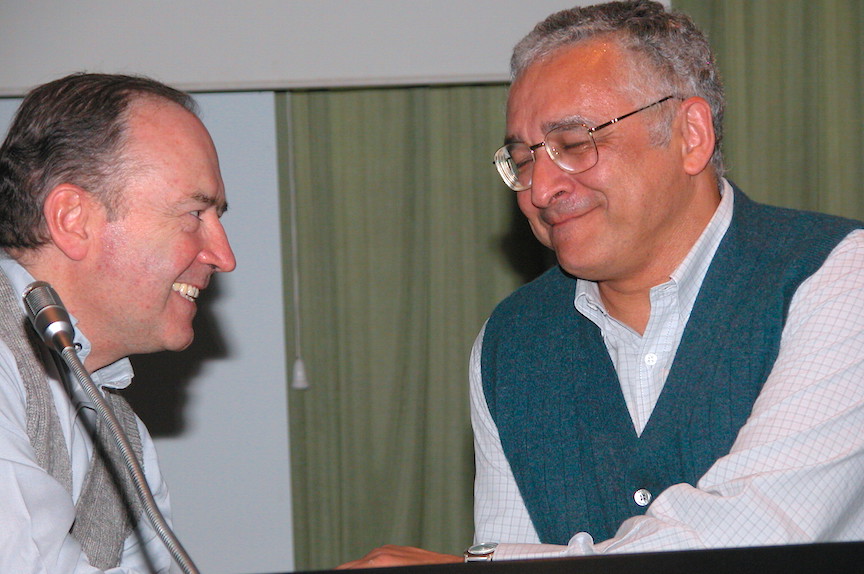
Fr. Virginio Bressanelli, out-going superior general, congratulates Fr. José Ornelas Carvalho on his election as general in 2003.
In May, 2003, Fr. José Ornelas Carvalho, SCJ, was elected to succeed Fr. Virginio Bressanelli (now bishop of Neuqún, Argentina) as Superior General of the Priests of the Sacred Heart.
Twelve years later, Fr. Ornelas is preparing for his own successor.
From academics to administration
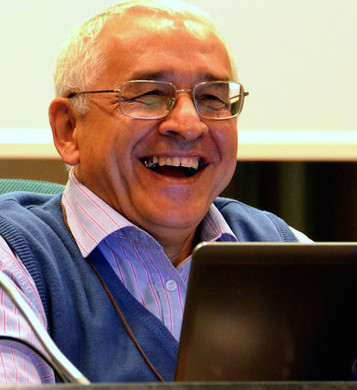 When Fr. Ornelas was named provincial superior of the Portuguese Province in 2000, he was just settling into what he thought would be his life’s path: teaching and formation. Three years earlier he earned a doctorate in Biblical Studies. “I had been teaching for about 11 years and thought that I had some capacity for it,” he said. “I saw myself doing research, being a biblical scholar, giving conferences.”
When Fr. Ornelas was named provincial superior of the Portuguese Province in 2000, he was just settling into what he thought would be his life’s path: teaching and formation. Three years earlier he earned a doctorate in Biblical Studies. “I had been teaching for about 11 years and thought that I had some capacity for it,” he said. “I saw myself doing research, being a biblical scholar, giving conferences.”
He admits that it was not easy at first to embrace the call to leadership, to leave the university and serve as provincial superior.
But soon he began to realize that as provincial superior, he was continuing the path that he was already on, not walking away from it.
Instead of living in the world of academics, “as provincial superior I could take the many theories that I had studied and transform them into action. I could make the theories real.”
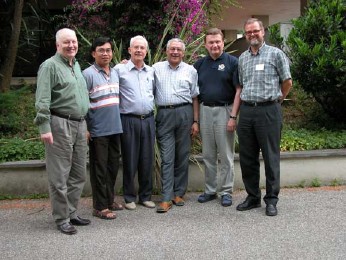 Like most people new to a job, Fr. Ornelas came to the superior general’s office with enthusiasm and many ideas, many dreams. “But I like to think that I am a practical man,” he said. “We needed ideas, but we also needed the patience to help those dreams grow into realities. You can’t dictate change, but you can give motivation to those who can make change.”
Like most people new to a job, Fr. Ornelas came to the superior general’s office with enthusiasm and many ideas, many dreams. “But I like to think that I am a practical man,” he said. “We needed ideas, but we also needed the patience to help those dreams grow into realities. You can’t dictate change, but you can give motivation to those who can make change.”
“We,” he emphasized. “We needed clear ideas.”
The “we” was an administrative team with little experience in general administration. “We had a new treasurer, new councilors; I, of course, was new to the task, but it was a real blessing,” said Fr. Ornelas. “During these years there has been much creativity. I am grateful to all who worked with us, even those who were only present for a short period of time. Fr. Marek Stoklosa [secretary general when Fr. Ornelas took office] was an excellent resource to us.
“Teamwork has always been very important to me. I can be an impulsive person. It is important to have a team of people in whom you can trust, with whom you can share ideas. And more so, to listen to.”
To help the administrative group build that sense of teamwork they took a week-long course on human resources and management at the Spanish Province’s ESIC business school in Madrid.
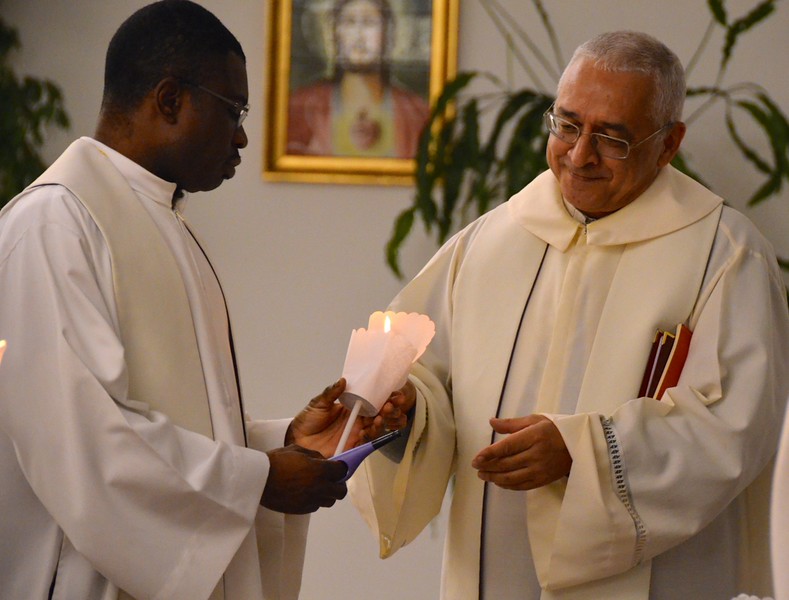 “Teamwork –– this is a path we must follow not only here in administration, but throughout the congregation,” he said. “Soloists can sing beautifully but we are a religious congregation; we must sing as a choir.”
“Teamwork –– this is a path we must follow not only here in administration, but throughout the congregation,” he said. “Soloists can sing beautifully but we are a religious congregation; we must sing as a choir.”
To build that “choir” Fr. Ornelas said that the congregation needs to continue to develop a sense of communion, of “sint unum.”
“This is done through transparency and solidarity,” he continued, emphasizing that the concept of a common purse is just one expression of communion. “It is not just about sharing resources, it is about having a common life, of being dependent upon one another, to need each other and serve each other. This is religious life. The rest will fall into place, but only if we truly live in community. Without that, there is no religious life, there is no solidarity.”
Reflecting the changing Church and world, the congregation is undergoing a transformation. When Fr. Ornelas was elected superior general in 2003, all of the major superiors of the African entities were European missionaries. “I looked around the meeting room and thought to myself, ‘it will never be this way again’ –– not because of any decision that I would make, but because the Church and the Congregation were changing.”
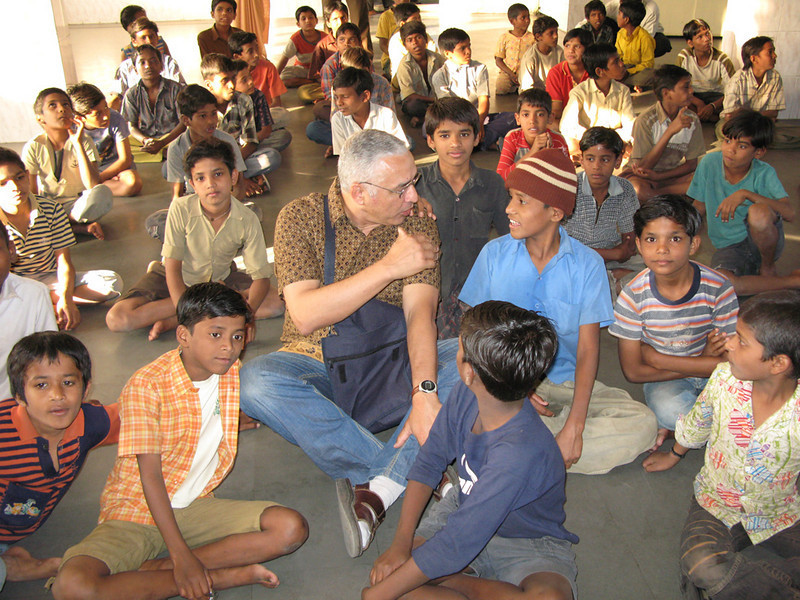 Certainly, the number of missionaries was diminishing, but more importantly, the number of indigenous SCJs in mission territories was growing dramatically.
Certainly, the number of missionaries was diminishing, but more importantly, the number of indigenous SCJs in mission territories was growing dramatically.
“Now, the majority of the responsibility of entities in Africa and Asia is in the hands of local confreres,” he said. “During my second visitation I experienced fully African Dehonian communities for the first time.” This was a dramatic change from his first term. In just a few years he was seeing a predominantly European-based community evolve into one where its members represent cultures and countries from all over the world.
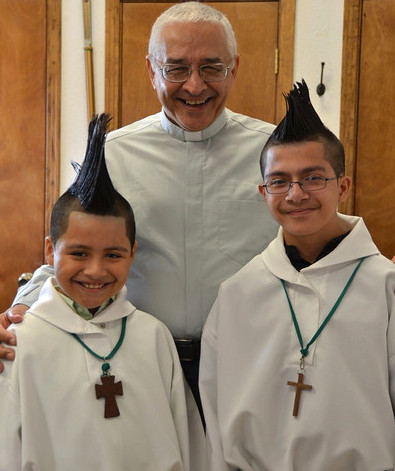 “It is exciting, it is gives me joy, but it is a challenge too,” said Fr. Ornelas. How can the Dehonian charism be realized in environments outside of its birthplace? “How do we mission WITH other cultures instead of TO them?”
“It is exciting, it is gives me joy, but it is a challenge too,” said Fr. Ornelas. How can the Dehonian charism be realized in environments outside of its birthplace? “How do we mission WITH other cultures instead of TO them?”
And then there are the nuts and bolts, the practicalities, including finances. When European provinces were missionaries “TO” other cultures they generally funded their efforts. But this too is changing. “Yet if we live our lives truly as religious brothers, living in solidarity, we will discover new ways of doing things, creative solutions for our whole congregation. Not just answers to individual concerns,” said Fr. Ornelas.
Internationality and a sense of mission are two of the building blocks of Fr. Ornelas’ view of the congregation. Before entering full-time into the world of academics, he served for two years as a missionary in Mozambique. “It changed me,” he said. “It opened my eyes to the internationality of the congregation.”
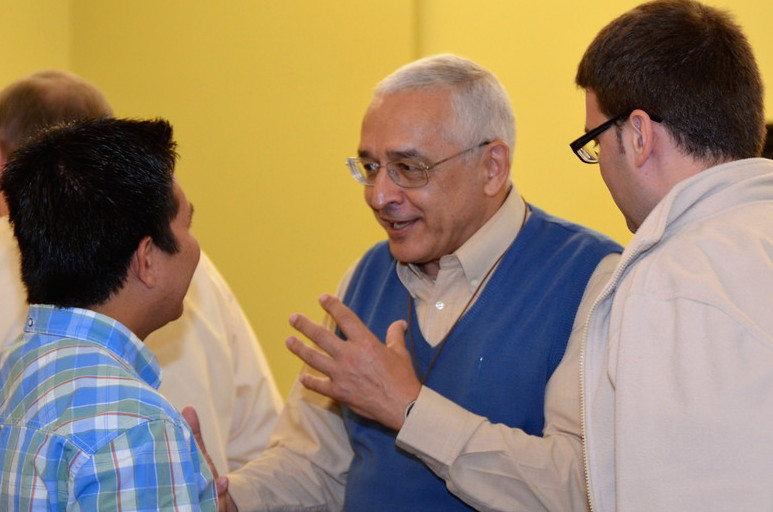 When asked what gives him joy in looking back over his two terms, Fr. Ornelas quickly lists the increasing areas in which the congregation is now found, including new missions in Vietnam, Taiwan, Angola, Chad and Paraguay. Also, he notes the international communities developing in places such as Berlin and Toronto. “These are examples of the congregation in mission, not just individual entities.”
When asked what gives him joy in looking back over his two terms, Fr. Ornelas quickly lists the increasing areas in which the congregation is now found, including new missions in Vietnam, Taiwan, Angola, Chad and Paraguay. Also, he notes the international communities developing in places such as Berlin and Toronto. “These are examples of the congregation in mission, not just individual entities.”
He speaks of what he calls “investments” that have been made in the members of the congregation through extended courses for formators and treasurers.
And, he is enthusiastic when talking about the wider Dehonian family, seeing the charism grow and lived in new ways among the laity. “If the charism is strong enough to move us, it needs to be shared with others,” he said.
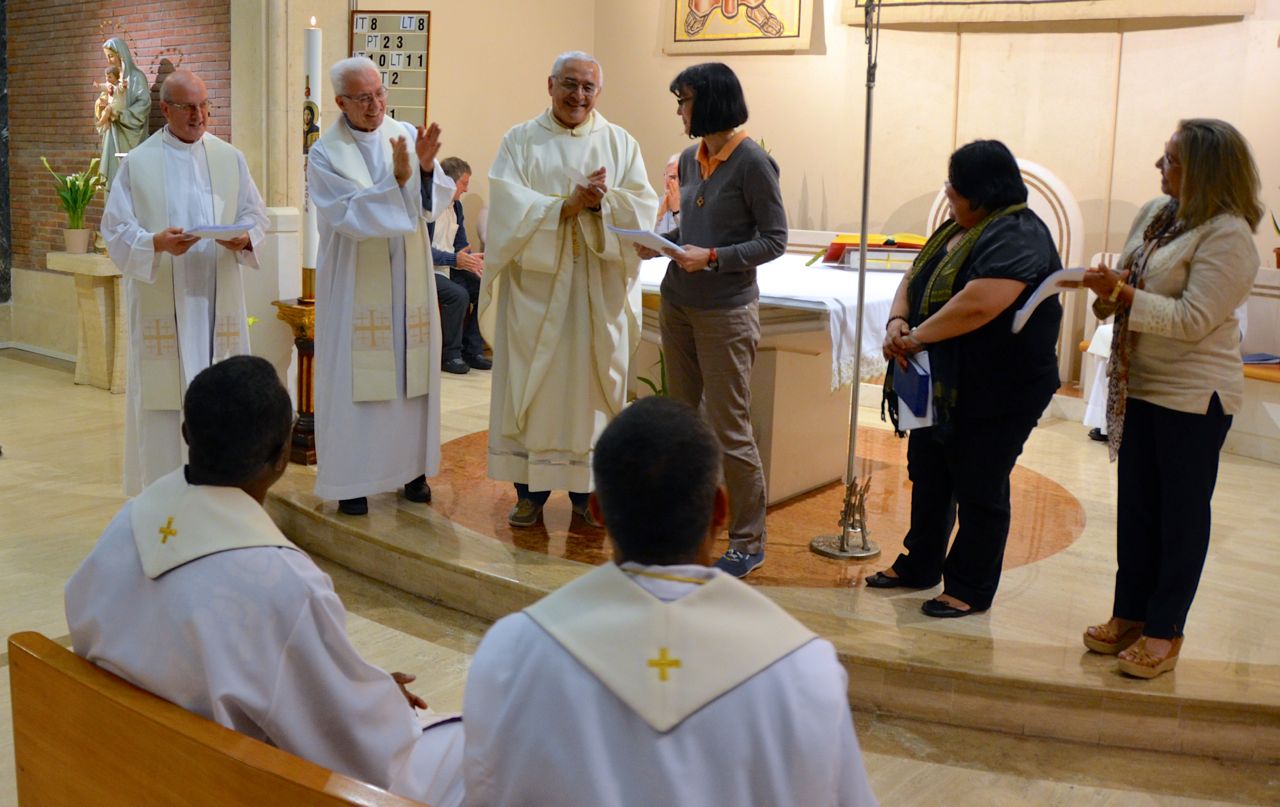 “It is important to collaborate more with the laity, not just out of necessity, but because they enrich our mission,” he continued. “Just as we are not self-sufficient in community, we are not self-sufficient as a community. We must be interconnected with others.”
“It is important to collaborate more with the laity, not just out of necessity, but because they enrich our mission,” he continued. “Just as we are not self-sufficient in community, we are not self-sufficient as a community. We must be interconnected with others.”
The challenges? While it is exciting to see how the congregation grows in new areas, there is also the reality that it is diminishing in its birthplace of Europe. “How do we as a congregation continue to address this?” he said. How does the charism find a new expression in the realities of Europe and North America today, and how does congregation minister to individuals and provinces that are aging?
“It is only as a congregation, in solidarity with one another, that we can respond to challenges, whatever they are” said Fr. Ornelas. “If we truly live as brothers, the answers will come to us. God never fails to assist His children!”
Chapter theme
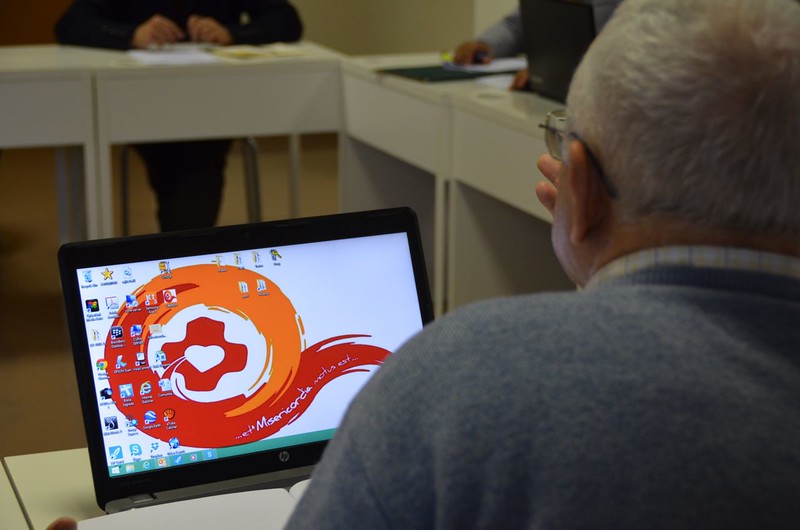 The theme of the upcoming General Chapter is “Merciful, in Community, with the Poor.” According to Fr. Ornelas it captures both who the Priests of the Sacred Heart are, and who they should be.
The theme of the upcoming General Chapter is “Merciful, in Community, with the Poor.” According to Fr. Ornelas it captures both who the Priests of the Sacred Heart are, and who they should be.
“The mercy of God is at the center of our spirituality,” he said. “If you do not show mercy, do not live mercy, you cannot be a Dehonian or a Christian.
“All of what we have been talking about, the challenges for the congregation and the joy of the congregation, are linked to mercy. Mercy in our communities is what allows us to be community, to be in solidarity, to share with each other and care about each other.”
As the congregation prepares for the General Chapter, it is not simply looking at better methods of operation. “We are not mission machines organizing our communities for greater efficiency,” he said. “We are religious brothers.”
Advice for his successor?
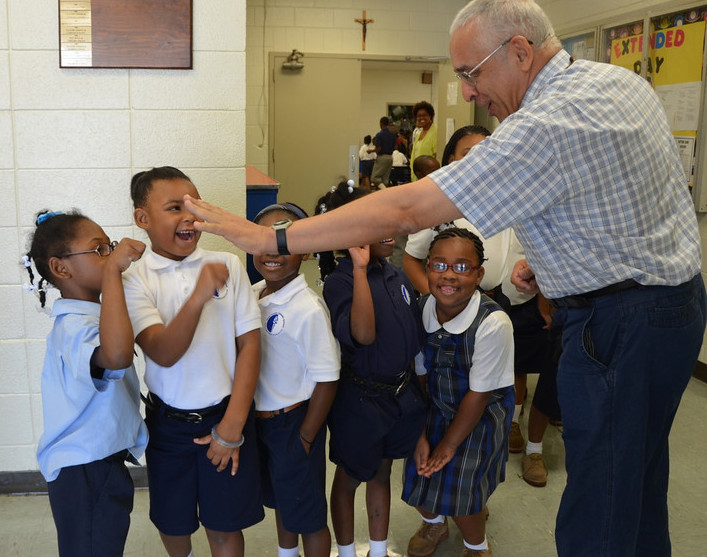 Fr. Ornelas belongs to a very small group. Including him, there are only two other living SCJs who have served as superior general: Fr. Antonio Panteghini and Bishop Virginio Bressanelli.
Fr. Ornelas belongs to a very small group. Including him, there are only two other living SCJs who have served as superior general: Fr. Antonio Panteghini and Bishop Virginio Bressanelli.
“We have developed a special bond, a strong connection,” said Fr. Ornelas.
When asked if he will have advice for the next superior general, he reflected back on what Bishop Bressanelli said to him.
“I asked Fr. Bressanelli to stay for a few weeks after I was elected but he said, ‘I don’t have much to teach you, you have to find your own way and God will lead you.’
“I feel the same. The best advice that I can offer is to share the story of the congregation as I know it. But the next steps? That is up to the next superior general and how he hears the call of God in the congregation in this moment. Always, the task of the general superior is to help the congregation discover how the Dehonian charism can speak to the world, minister WITH the world, in a particular moment of time.”
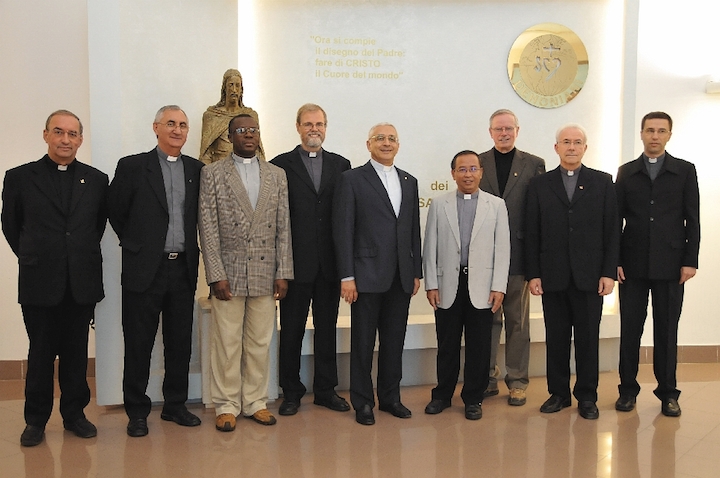
The general administration in 2009


